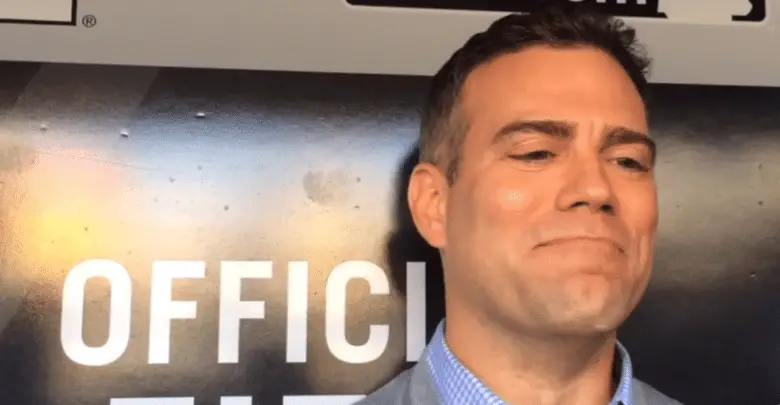
Epstein Addresses Machado Rumors: Cubs ‘Will Not Be Paying Premiums for Rentals’
With Manny Machado almost certain to be traded by this year’s deadline and the Cubs seeming like a fit due to both their current personnel and offensive inconsistency, it makes sense that rumors and reports would connect a few dots. Then you’ve got the Cubs’ penchant for making significant trades and Tom Ricketts’ acknowledgement that the “baseball guys” are free to do as they see fit with acquisitions, and more conclusions are drawn.
Well, except that hypothetical thought bubbles are easily popped by the the sharp prick of reality, which is exactly what Theo Epstein provided Thursday morning. Not that I’m calling Epstein a prick, mind you, though he can be acerbic. The Cubs’ baseball boss was actually pretty blunt when he joined the Bernstein and McKnight Show on 670 The Score to discuss the idea of swinging a blockbuster trade for a guy who’s only under contract through the remainder of the year.
“As a rule, we will not be paying premiums for rentals,” Epstein declared. “We just won’t. It’s hard to build an organization that way. Let’s be honest: We’ve poured a lot of resources into this team and this group, a lot of crazy dollars and a lot of trade resources. We’ve made a number of trades over the last few years.
“If we play ourselves into a position where we can benefit from some improvement and we’re a legitimate championship contender, absolutely we will be pushing the envelope to try to get better. But that will probably not include paying a significant premium of future assets for a rental, because we have to build this organization and keep our focus on this group and this year’s team and the immediate future in the next couple years but also keep an eye on what’s going to happen after 2021.
“We can’t be sacrificing all of our future assets in drafting guys exclusively to trade them. We can’t do that. We have to build farm system. It’s been used quite a bit to support this group, and we need to start growing the farm back as well.”
Okay, that all makes plenty of sense on the surface, particularly when you consider that the Cubs won’t be able to retain every single one of their current core players once their rookie deals expire. That means replacing them with the next wave of young players whose minimum salaries can offset the extensions or free-agent deals the Cubs will have to sign to keep or add big-time players.
But given their insane profits — which only figure to grow as the gentrified mint that is the surrounding neighborhood continues to boom — and a wide-open window for contention, doesn’t it make sense to keep improving the big league club by any means necessary?
“Look, we’ve only paid a real premium for a rental one time, and that was when we traded Gleyber Torres for Aroldis Chapman,” Epstein explained. “And that was a sort of special circumstance in our mind. We felt we had a team that was an extraordinarily strong contender for the World Series, but there were some things going on in our bullpen that led us to conclude there was going to be a real need down the stretch and especially in October, and if we didn’t do something, we weren’t going to win the World Series.”
The Cubs also paid a high price in the Jorge Soler-for-Wade Davis deal, though they at least got a full season with the closer. Then there was the trade that sent Jeimer Candelario (whose 1.4 fWAR is currently third among all MLB third basemen) and Isaac Paredes (who isn’t lighting high-A on fire, but who’s still super talented) to Detroit in exchange for Justin Wilson and Alex Avila. Neither deal was a full-on rental, but both were made with similar intent to that described in the Chapman trade.
We’re really dealing with a matter of semantics, which is something Epstein knows quite well. As I’ve said repeatedly over the last several years, the man always means what he says even when he doesn’t say exactly what he means. Those statements above seem pretty ironclad, though, so are we to believe the Cubs are not going to be in on Machado after all?
Not so fast, my friends.
Let’s dissect the eight most important words from Epstein’s interview: “We will not be paying premiums for rentals.” That makes perfect sense and I think everyone can buy into it. But what if the Cubs were able to work out an extension with Machado? Then he’s no longer a rental and not subject to the rule Epstein established.
Seems pretty simple, though I think there’s yet another way to view this that keeps Epstein from being a hypocrite even if the Cubs did swing a trade for a guy who walks at the end of the season. For that, I turn to the “paying a premium” part and I then add in “We can’t be sacrificing all of our future assets in drafting guys exclusively to trade them” for additional context.
Now that I look back at it, I could have just pulled out this particular line “But that will probably not include paying a significant premium of future assets for a rental.” The “probably” kind of jumps off the page, particularly when placed in the context of the rest of what Epstein is saying. While he’s talking about building up the farm and not sacrificing prospects, he’s not necessarily ruling out moving current MLB players.
Addison Russell, Ian Happ, and Mike Montgomery have been among the names being mentioned as part of a return for Machado, so the Cubs could perhaps make a deal without touching the farm. That’s admittedly a stretch on my part, so please take that with a grain of salt and perform your own translations of the unspoken words in the margins of Epstein’s statements.
Finally, there’s the idea that the premium in question is relative to what the Orioles were seeking this winter. Had they traded Machado at that point, his new team would have him for the whole season and would also be due a compensatory pick should he indeed depart in free agency. The proration of his production and the absence of a pick (or the ability to flip him) should impact Baltimore’s asking price.
I’ll leave off with any further discussion of what a deal would look like or what its impact on the Cubs would be, as my goal here was simply to parse Epstein’s words in an effort to show that they may not have been as direct as they first seemed. It’s certainly an interesting topic, though, and one well worth discussing around the ol’ water cooler.
So what do you think, Dear Reader, am I just trying to pick at the fabric to create loose ends that were never really there in the first place? Or do you think there’s more to what Epstein is saying than meets the eye (or ear, as the case may be)?

